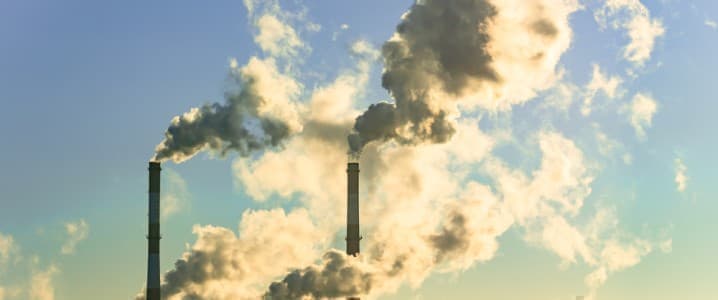In an attempt to show that they are finally taking heed of the rapidly aggravating problem of air pollution, authorities in Uzbekistan have slapped fines on two major state-run power plants for causing harm to the environment.
Tashkent thermal power plant, or TTP, and the Novo-Angren TPP will in aggregate be required to pay 2 billion sums (about $160,000) for flouting air quality standards, failure to comply with proper waste disposal protocols and oil spillages.
The penalties levied earlier this month by the Ecology Ministry came amid growing anxiety about rising air pollution levels in the capital, which is home to around 3 million people.
Over the weekend, Tashkent was again listed among the top 10 most polluted cities worldwide. IQAir, a Swiss technology company monitoring air quality in real-time, rated the city's air quality index (AQI) at 156, categorizing it as “unhealthy."
Inspections at the Tashkent TPP, a primary thermal power plant in the city, revealed occasional use of fuel oil as a backup and a lack of emission control systems.
The situation was no better at the Novo-Angren TPP, which is located about 80 kilometers from Tashkent. The efficiency of purification equipment at that plant was reported to stand at just 20 percent.
The national leadership has slowly begun to concede the seriousness of the issue.
President Shavkat Mirziyoyev late last month admitted that pollution levels in Tashkent and in the surrounding region are significantly higher than in other parts of the country.
Mirziyoyev gave orders to phase out the production of AI-80, Uzbekistan’s most popular and cheapest automobile gasoline, which also poses more risks to the environment due to its low quality. It has been identified as a driving cause of bad air in Tashkent, especially in winter, when people switch to it for lack of available natural gas.
Another measure is targeting the highest-emitting enterprises. By the end of 2024, more than 120 companies will have to install modern emission control equipment and filters. It is not clear, however, what these companies are and how their compliance is to be tracked.
Some revisions have also been made to environmental laws. Under measures approved by the Senate in January, enterprises may be ordered to halt operations for a period of 10 days if they pose a “threat to the life and health of the population due to excess pollution.”
Many enterprises, nevertheless, use coal as fuel to generate electricity, and the government is at a loss to suggest any immediately viable alternative.
This situation became especially acute last year, when greenhouses, factories and other facilities were switched to coal fuel in the face of gas shortages. The result was a gray ring of emissions that formed around Tashkent.
Ecology Minister Aziz Abdukhakimov acknowledges the challenge of balancing economic interests with environmental concerns.
“We are demanding the installation of soot collectors, and dust and gas purification devices at thermal stations. This costs millions of dollars. And of course they will then say: ‘If we buy [this equipment], we will have to raise the price of electricity supplied to the public,’” Abdukhakimov said in an interview to news website Gazeta.uz. “Everyone has their own pains and problems, but our job as the Ecology Ministry is to protect the environment and nature.”
Another problem issue is construction. But that is an area where officials tread more cautiously.
Last month, the Ecology Ministry suggested restricting construction activity to reduce the amount of dust in the air.
Mirziyoyev, however, was more measured, conceding only that most projects do not undergo the required environmental impact assessments. As mitigation goes, he issued instructions for construction companies to be “socially responsible” and create “green belts” in Tashkent.
To make up for Tashkent’s ongoing loss of green spaces, as countless trees fall victim to real estate developers, the government plans to create at least 3,000 hectares of so-called “green belt” spaces and 200 hectares of “green parks” that should cover the city and the Tashkent region.
Tashkent residents are also to be provided with real-time air quality data through scoreboards and monitors on the city’s streets.
More Top Reads From Oilprice.com:
- Buffett’s Berkshire Increases Stake in Chevron and Occidental
- Redox Flow Desalination Offers Potable Water and Energy Storage
- Trump Vows to Block U.S. Steel Acquisition


















